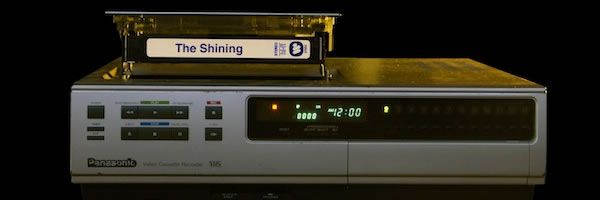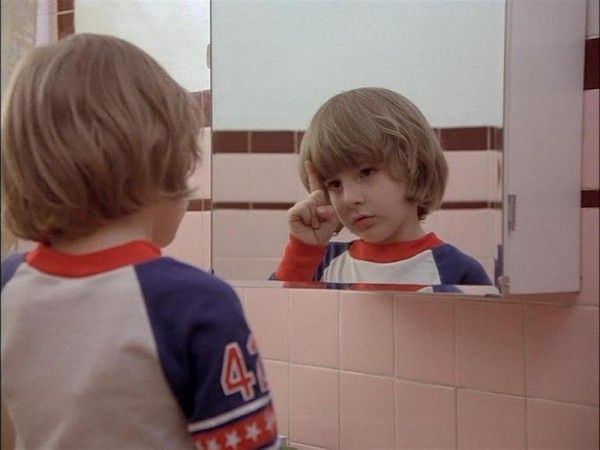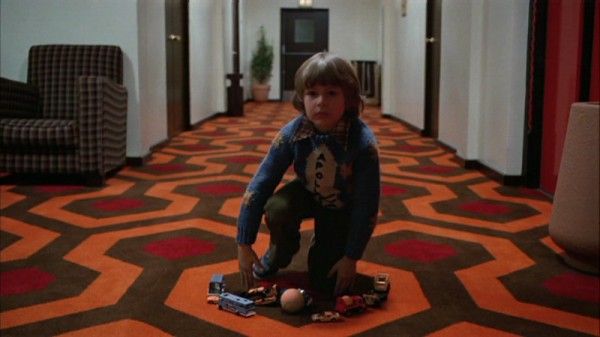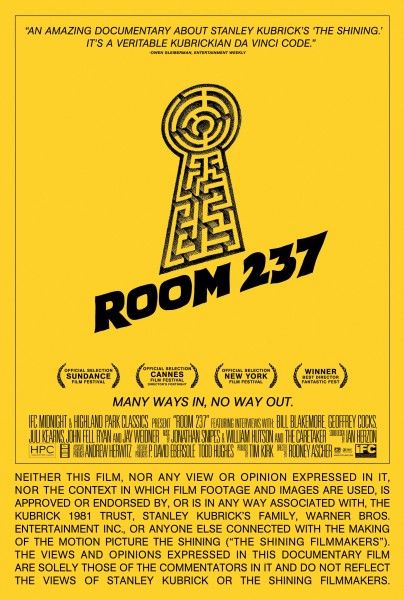[This is a re-post of my review from the 2012 Sundance Film Festival. Room 237 opens today in limited release and is also available on VOD.]
Stanley Kubrick's The Shining is about characters who are drawn into madness by their surroundings. Rodney Ascher's Room 237 is about film critics who are drawn into madness by The Shining. Films that offer up numerous interpretations are like crack to film critics. Movies that are so broad that any interpretation is valid are like bad crack, but a film like The Shining, a film helmed by a notoriously meticulous director and filled with unexplained mysteries and symbolism, is the best kind of film critic crack there is. Room 237 is both a celebration and pointed critique of film criticism. The movie shows how people can think big and expand their minds by thinking deeply and passionately. It also shows how our minds can run away from us and how we'll twist a movie apart in order to fit our theory rather, and fail to realize that our argument is crazier than Jack Torrance.
Room 237 moves through nine chapters. The first chapter introduces the five different critics who will be providing their theories throughout the film. The critics are never seen, which helps us focus on their words, and also keeps us locked in the constant flow of footage from The Shining, Kubrick's other works, and non-Kubrick films. After the first chapter, Ascher divides up the film into aspects that critics notice such as the production design, the framing, peculiar moments, and how it all ties together. According to the critics interviewed, The Shining could be about American violence towards Native Americans, the Holocaust, or how Kubrick subtlety revealed that he directed the "faked footage of the moon landing." Woven into these arguments are fascinating points like the impossible layout of the Overlook Hotel and rather stupid arguments like using numerology to point out the importance of the number "42".
One of the film's greatest flaws is a good one to have: it makes you want to leave in the middle of the picture and go watch The Shining along with all of Kubrick's other movies. Deep critical analysis of a Kubrick film is completely warranted because of the director's obsessive attention to detail. It's tough to argue that anything in a Kubrick film was done by accident. However, because Kubrick is known for his meticulousness, it opens up the door to every critic who wants to look at every detail and build an argument. And even that isn't good enough as critics begin to use their imagination to see things that have the rest of us scratching our heads. One of the film's critics argues that Kubrick airbrushed himself into the clouds that are seen at the beginning of the movie.
Ascher knows that these theories can get out of control. It's hilarious when one critic begins an attempt to prove that The Shining is Kubrick's secret confession about filming the fake moon landing. The critic prefaces his theory by saying, "I'm not saying that we didn't go to the moon. I'm just saying that the footage was faked." And then he starts pointing out Danny's Apollo 11 shirt, the fact that the moon is roughly 237,000 miles from Earth, and (my personal favorite) he notes that the 237 room key reads "Room No. 237" "There's only two words you can spell," notes the critic, "'Room'…and 'moon.'" After the screening, I overheard someone say, "You can also spell 'moron.'"
But Ascher doesn't dismiss all of the theories. The numerology guy gets a little out of control with his Holocaust theory (he says "42" pops up because it's a reference to 1942), but when you combine the Holocaust theory with another critic's theory about the injustice towards Native Americans, you start seeing the possibility that Kubrick is exploring a history of violence. The Overlook Hotel is built on blood. The Torrance family isn't the hotel's first victim. They're just the latest in a long line dating back to who knows when. Room 237 shows that we can't develop our own theories if we're not willing to hear what others have to say. Without critics at least willing to push forward a theory and attempt to provide a justification, then we're stuck with consumer reviews*.
Room 237 absolutely believes that some viewpoints are valid like when it shows the shifting architecture of the Overlook (such as Danny riding his tricycle on the first floor, turning a corner, and then he's on the second floor). It takes some obsession to find it, but when you do, it adds more to the experience because there's a new dimension to both the horror and the character of the Overlook Hotel. There are moments where Ascher needlessly repeats his point (one chapter is devoted to a minor character that's built up by critics into a significant figure), but he also gives his film a lot of personality and makes it not just a bland, academic analysis on the state of modern criticism. You don't need to be a movie critic to enjoy Room 237. You just need to be a movie lover. Also, having seen The Shining at least once wouldn't hurt.
Rating: A-
*And I know I do a lot of those. I'm fascinated by structure but I also evaluate movies piecemeal. Some films I can suss out a subtext and some films are Prince of Persia: The Sands of Time.




